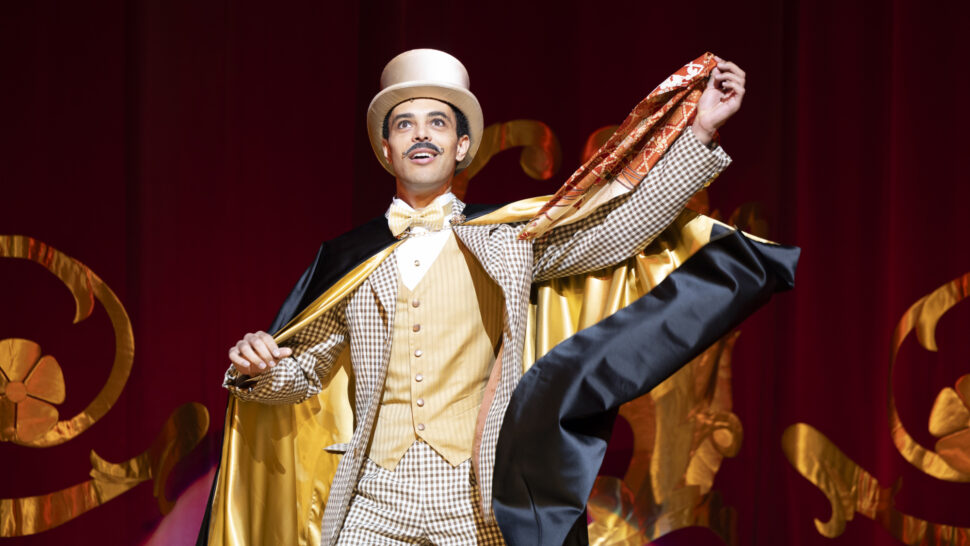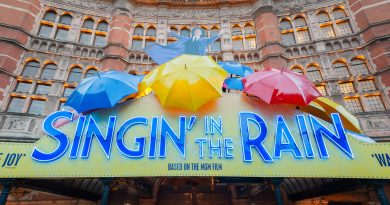The Surprising Revival Of LOVE LIFE
The story of LOVE LIFE is nearly as intriguing as the show itself. Written in 1948 by Kurt Weill (composer of Mack the Knife fame) and Alan Jay Lerner (the wordsmith behind such classics as My Fair Lady), it was a product of an era defined by inventive Broadway experiments. Famously, an American Federation of Musicians recording ban in 1948 prevented cast albums for many productions, but it proved especially devastating for LOVE LIFE. This particular musical vanished for decades—its score unrecorded, its scripts unpublished, and its entire existence largely confined to the memories of those who’d been lucky enough to see its original run.
What makes LOVE LIFE stand out? First, it’s widely considered a precursor to the “concept musical,” a style that would become all the rage with shows like COMPANY and CABARET in later decades. Secondly, it tells the unconventional story of an ageless couple, Sam and Susan Cooper, traversing centuries of American history while the rest of the world ages around them. Their adventures are punctuated by vaudeville-style sketches that comment on everything from marriage to consumerism—heady stuff for a Broadway audience back in the day. And yet, after its initial success, the show simply faded away.
It wasn’t until 1987—nearly forty years later—that the University of Michigan’s Musical Theatre Program revived LOVE LIFE. Afterwards, interest in the musical began to bubble once more, culminating in a critical edition of the score being published in 2023. Now, Opera North has seized the moment to bring it fully to life, capturing the piece in its entirety for the first time.
Opera North’s Daring Leap
Enter Opera North of Leeds, the adventurous company that decided to record this once-forgotten musical. Conducted by James Holmes, the production was recorded only last month, featuring baritone Quirijn de Lang and soprano Stephanie Corley as the Coopers. To flesh out the show’s kaleidoscope of vaudeville acts and ensemble numbers, the cast also includes Justin Hopkins, Themba Mvula, Will Hopkins, Joshua Da Costa, Andrew Randall, Masimba Ushe, Holly Saw, Max Westwell, Tilly Baker, Louie Stow, Felicity Moore, Amber Midgley, and Lottie Gray. It’s a formidable lineup of talent, deftly handling Weill’s intriguing mix of popular song and theatrical underscore.
It’s not just a single microphone and a quick read-through, either. By all accounts, this was a meticulously planned production, honouring the newly published critical edition of the score. In other words, audiences can finally hear Weill and Lerner’s work as it was meant to be heard—or as close as we can get, given the swirl of lore surrounding this piece. Opera North’s willingness to invest in a lesser-known American musical underscores their commitment to exploring the broader repertoire, a hallmark of their bold approach. After all, Leeds is hardly the first place you’d expect to find an obscure slice of the Great White Way’s Golden Age, yet here they are, blazing a trail.
Tune In
First and foremost, the BBC broadcast on Radio 3 (slated for 1 PM ET on 22 February) is momentous because it marks the radio premiere of the first ever full recording of LOVE LIFE. If you’re an aficionado of Broadway lore—or simply curious about the evolution of musicals—this is a must-listen. For 30 days following that initial airing, you can stream it online, meaning you have a generous window to immerse yourself in Weill’s melodic intricacies and Lerner’s sharp, satirical lyrics.
Beyond historical curiosity, there’s the sheer novelty of hearing something that’s practically new to most of us. Many musicals from the same period have been revived ad infinitum, but LOVE LIFE has spent decades lurking in the shadows. If you’re someone who revels in discovering “lost” works—those hidden gems that have shaped theatre history in quiet ways—this broadcast offers a rare chance to experience an authentic piece of 1940s Broadway. In addition, the melding of vaudeville numbers with a narrative that spans centuries of American life gives the musical a patchwork quality reminiscent of more modern concept musicals. Some even argue that LOVE LIFE presaged the concept-heavy approach that directors like Hal Prince later embraced. Here, you can hear the embryonic traces of that future style.
A good example of the show’s uniqueness is the tune Green-Up Time, which uses sprightly rhythms and a playful melodic structure to contrast against heavier social commentary in the piece. This juxtapositional style feels distinctly postmodern, despite predating the official “postmodern” era. And that’s precisely what excites historians and fans alike: LOVE LIFE was, in many ways, ahead of its time.
The Influence Of The Recording Ban
If you’re anything like me, you might wonder how a single union ban in 1948 could cause such lasting repercussions for a Broadway show. The American Federation of Musicians was, at the time, fighting for better compensation and conditions for instrumentalists. Their strict stance included limiting certain recording opportunities. While the ban served a valid labour purpose, it inadvertently led to gaps in our theatrical record. Many popular scores were eventually captured once the ban was lifted, but LOVE LIFE—perhaps due to its conceptual complexity or simply unlucky timing—never had the chance. Now, thanks to Opera North, we have a chance to fill that historical gap.
This detail might surprise younger theatre fans accustomed to near-instant cast album releases. Today, we see new shows capturing their sound within weeks of opening—take Hadestown or Six, for instance, which enjoyed near-immediate recordings. Yet back in 1948, the industry’s reliance on union consensus meant a single dispute could lock an entire musical into obscurity. There’s something rather poignant about that if you think of how many ephemeral masterpieces might have been lost altogether had it not been for occasional revivals.
What Happens Next?
A recording is hardly the end of the story. Opera North has also announced plans to release the album on CD via Capriccio, promising further details soon. Meanwhile, across the Atlantic, the City Center Encores! series is preparing its own staging of LOVE LIFE, directed by Victoria Clark and featuring musical direction by Rob Berman. This production, starring Kate Baldwin and Nicholas Christopher, runs from 26–30 March at New York City Center. The timing could scarcely be more perfect: fans can soak up Opera North’s meticulously preserved audio before witnessing a fresh stage interpretation in the Big Apple. There’s a certain synergy here that might well thrust LOVE LIFE into the mainstream consciousness, or at least secure its position as a newfound cult favourite.
For Australian theatre buffs, the moment is ripe to follow suit. We have a thriving environment of music theatre societies and professional companies that aren’t afraid of tackling overlooked works—look at the growing interest in Golden Age musicals and lesser-known Sondheim pieces. With LOVE LIFE gaining traction overseas, perhaps local companies will seize the day and give this rarely staged gem an Aussie premiere. Stranger things have happened.
Some might ask, “What’s all the fuss about one obscure show?” The answer lies in how theatre history evolves: it’s shaped not just by the blockbusters that everyone knows, but also by the quieter pieces that paved the way for future innovations. LOVE LIFE’s melding of narrative and vaudeville might have sown seeds for the likes of CHICAGO or ASSASSINS. More than that, it stands as a testament to the spirit of rediscovery—of rummaging through the dusty corners of the Broadway archives and unearthing a masterpiece that’s been waiting, all this time, for the spotlight it deserves.
From a purely musical standpoint, Kurt Weill is revered for blending European influences with the American idiom. His work on LOVE LIFE sits at a pivotal juncture in his career, bridging earlier, more cabaret-like tunes with the distinctly American style that blossomed in his final years. As for Alan Jay Lerner, he went on to dazzle the world with hits like BRIGADOON and PAINT YOUR WAGON, but here we encounter him experimenting with form and structure in a way that’s delightfully daring. For any theatre enthusiast, hearing these legendary artists stretching themselves is an incomparable treat.
Curtain’s Up On A Lost Treasure
At the heart of it all, LOVE LIFE reminds us that theatre is forever evolving and that even so-called “lost” works can resurface in magnificent form. Opera North’s commitment to meticulously recording the show, combined with the BBC’s broad reach, means we’re on the verge of what could be a watershed moment for Weill and Lerner’s half-forgotten musical. And with the City Center Encores! presentation hot on its heels, there’s a palpable sense that this time, LOVE LIFE is here to stay.
If you’ve ever lamented the scarcity of fresh discoveries in mid-century musical theatre, consider this an invitation to tune in, to let your curiosity guide you, and to embrace the novelty of encountering an American classic that, for all intents and purposes, is brand new. Sometimes, all it takes is one recording to rekindle a flame that’s lain dormant for decades. And when that flame ignites, it’s not just a show that comes back to life—it’s a piece of history, shining just as brightly as the day it first stepped onto the stage.
So mark your diary for the BBC broadcast, keep an ear out for the upcoming CD, and if you happen to be in New York this March, grab a ticket to City Center Encores!. You’ll be witnessing the next chapter of a story that began in 1948, left only faint footprints over the years, and has finally returned to claim its rightful place in the musical theatre canon. That, I’d say, is worth celebrating.



